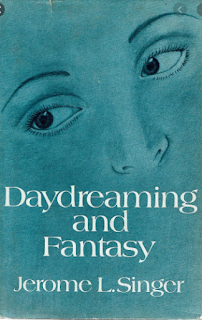I ordered this 1975 psychology textbook from AbeBooks at vast expense -- well, a lot more than I usually pay to feed my book habit! -- but it wasn't quite what I was expecting. It was a very earnest discussion of the benefits of fantasising and daydreaming.
Jerome Singer reminds me of those people who argue in favour of the arts or healthcare in terms of their economic benefit, rather than their intrinsic worth. He was very keen to point out that daydreaming about possible futures can help the daydreamers turn those futures into reality; that imagination and creativity can lead to invention and innovation (and economic benefit, presumably); that fantasising can help develop empathy and compassion, and often hardcore daydreamers spin their fantasy habits into an artistic or literary career. Well, that's all great, but it came across a little too try-hard for me.
My favourite section of Daydreaming and Fantasy was where Singer discussed his own daydreaming habits -- putting himself to sleep at night with imagined baseball games, spinning elaborate childhood stories where he became a senator and a famous singer. I wanted more of this stuff, and less of the experiments on distractibility!
My reading of Daydreaming and Fantasy coincided with a family obsession with Bluey, and reinforced the importance of play and imagination games in early childhood. Bluey is all about the benefits of pretending -- imagination, negotiation, processing troubling events, trying on activities and feelings, and most of all, fun. Unfortunately Daydreaming and Fantasy mostly neglected the enormous enjoyment that imagining can provide.
Subscribe to:
Post Comments (Atom)















No comments:
Post a Comment
0 comments